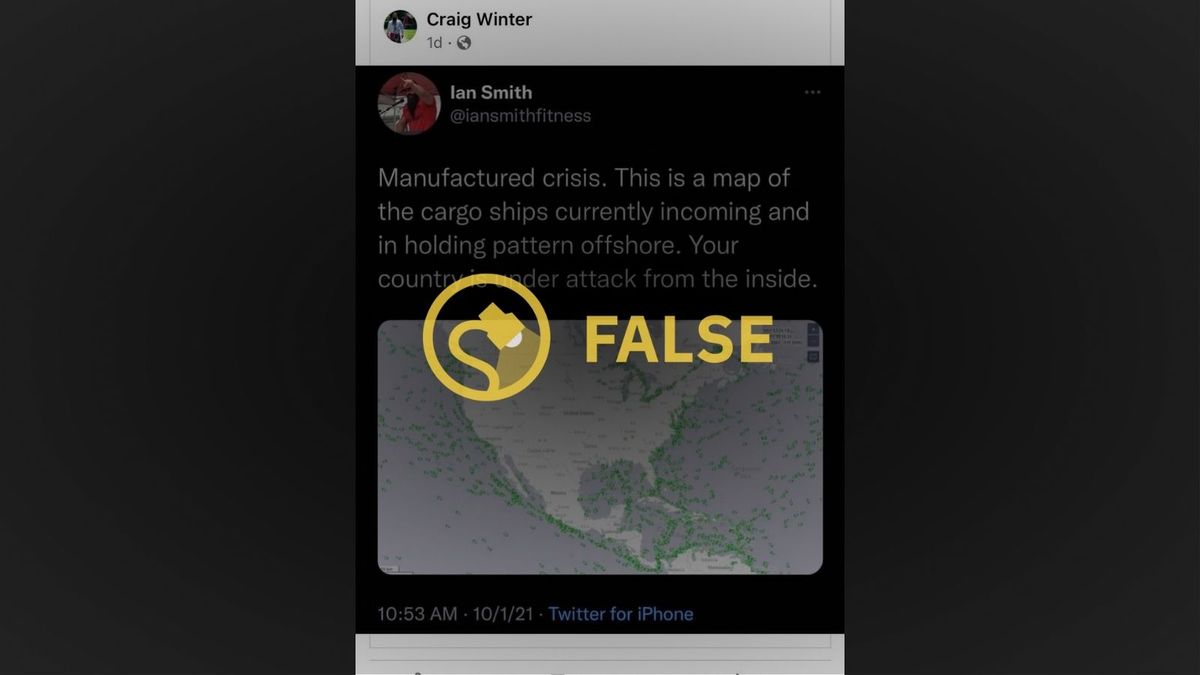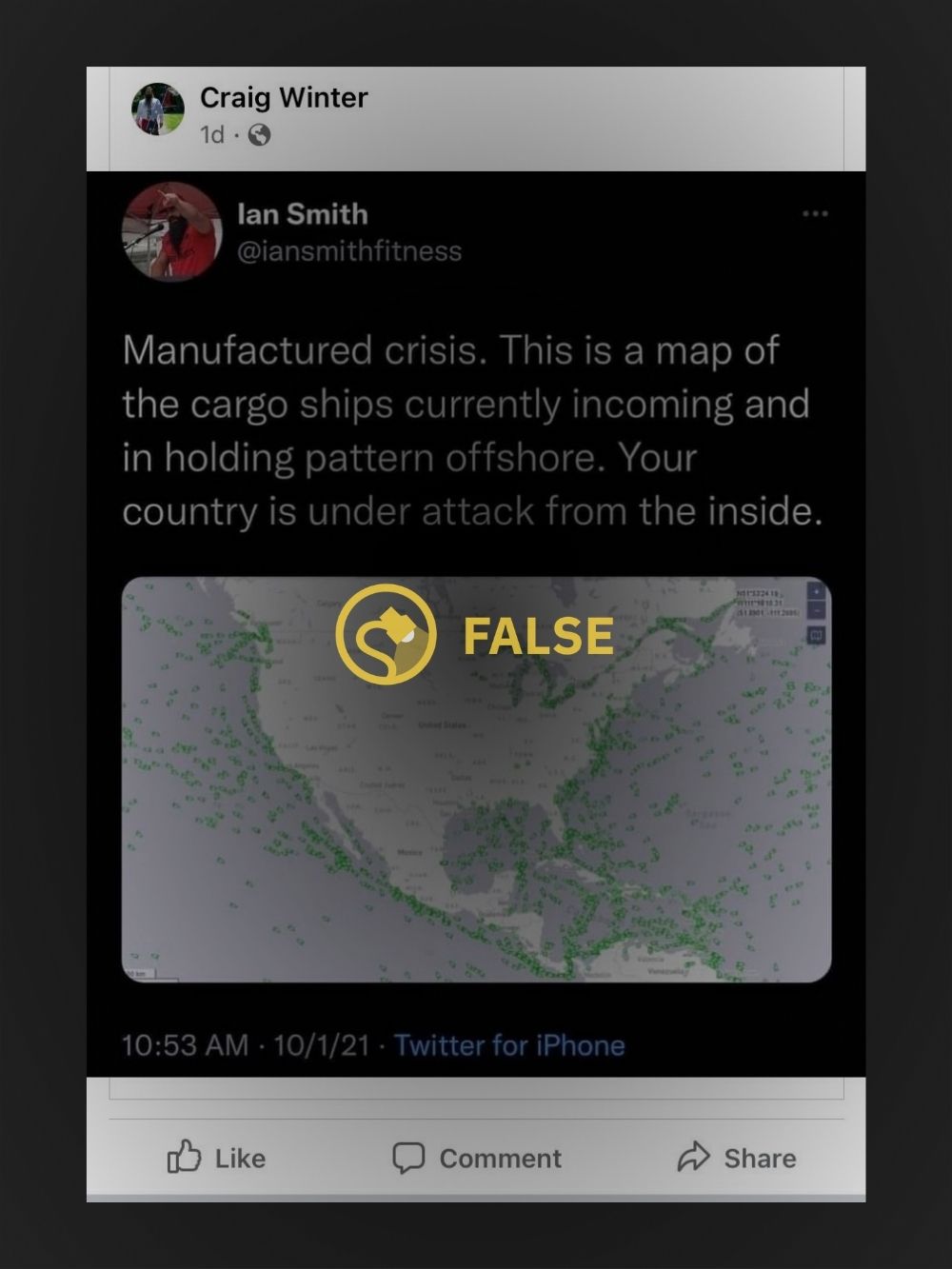In late 2021, the United States faced a supply chain crisis during a global pandemic. Across numerous ports, including along the west coast, cargo ships were backed up, leading to worries of nationwide shortages of various goods.
But this was not just limited to the U.S. Globally, around 584 container ships were stuck at ports around the world in mid-October.
Of course, this led to rumors and speculation about the reasons behind the backlog. Our readers sent us screenshots from across social media, suggesting that the entire backlog of ships was a “manufactured crisis.”
Some of our readers asked us if this was part of a “communist plot,” while others suggested that labor unions were behind it. For example, we got a message saying: “The Unions aren't allowing truckers, employees, no one, to unload these containers. The employees are being paid not to work...but that's not their choice.”
Looking into news reports of the supply backlog, we learned that the biggest reason for these issues was the fallout from the global COVID-19 pandemic. There is no evidence that this was a "manufactured" crisis, let alone a communist plot, but it did expose the flaws in the current systems on which the world and the U.S. depend.
A Washington Post report analyzed the reasons behind the failings at the ports. Primary among them, during the pandemic there was an overall reduction in spending at restaurants, theaters, and sports events, and an increase in spending on goods like laptops and bicycles, which triggered a sudden increase in imports that overwhelmed freighters.
According to the BBC, 25% more cargo was shipped from Asia to the U.S. in the first eight months of 2021, compared with the same period in 2019 before the pandemic.
In 2021 alone, the Los Angeles port was expected to handle 10.8 million containers of goods, a record amount, partly due to the high demand for goods during the pandemic. As a result, the International Longshore and Warehouse Union (ILWU) had even increased training and hiring of workers, which resulted in workers reporting feeling overworked and exhausted. At least 20 ILWU members died while working through the pandemic, the union reported.
Transportation systems were also already weak from before the pandemic. Gene Seroka, executive director of the Port of Los Angeles, told The Washington Post that U.S. ports were “decades behind” foreign ports in getting carriers, terminals, and shippers to provide each other access to commercial data for planning purposes. Privacy concerns over data resulted in a “fragmented” system, with individual ports operating independently and not as part of a nationwide system.
But this was not the first time workers in shipping and transportation had raised the alarm. In September 2021, industry groups, including the International Chamber of Shipping (ICS), warned of a "global transport system collapse.” In an open letter, they said:
Our calls have been consistent and clear: freedom of movement for transport workers, for governments to use protocols that have been endorsed by international bodies for each sector and to prioritise transport workers for vaccinations as called for in the World Health Organization’s SAGE Roadmap for Prioritizing Uses of COVID-19 Vaccines in the Context of Limited Supply.
[...]
The impact of nearly two years’ worth of strain, placed particularly upon maritime and road transport workers, but also impacting air crews, is now being seen. Their continued mistreatment is adding pressure on an already crumbling global supply chain. We are witnessing unprecedented disruptions and global delays and shortages on essential goods including electronics, food, fuel and medical supplies. Consumer demand is rising and the delays look set to worsen ahead of Christmas and continue into 2022.We have all continued to keep global trade flowing throughout the pandemic, but it has taken a human toll. At the peak of the crew change crisis 400,000 seafarers were unable to leave their ships, with some seafarers working for as long as 18 months over their initial contracts. Flights have been restricted and aviation workers have faced the inconsistency of border, travel, restrictions, and vaccine restrictions/requirements. Additional and systemic stopping at road borders has meant truck drivers have been forced to wait, sometimes weeks, before being able to complete their journeys and return home.
President Joe Biden announced a number of changes in mid-October to tackle the crisis, most notably an increase in working hours for the ports and workers in Los Angeles:
After weeks of negotiation and working with my team and with the major union and retailers and freight movers, the Ports of Los Angeles — the Port of Los Angeles announced today that it’s going to be — begin operating 24 hours a day, 7 days a week. This follows the Port of Long Beach’s commitment to 24/7 that it announced just weeks ago.
Twenty-four/seven system — what most of the leading countries in the world already operate on now, except us, until now.
This is the first key step toward moving our entire freight transportation and logistical supply chain, nationwide, to a 24/7 system.
Workers had not been stopping work at ports. Rather, they had been overworked through the pandemic, and their work hours were only increasing.
Biden also called on major retailers to step up and reduce the bottleneck by moving the goods from ports, adding that Walmart had committed to increasing their use of off-peak hours by 50% in moving products, and FedEx and UPS also planned to move more goods by night. He added a particular note of thanks to labor groups and unions like Teamsters, Transportation Workers Union, and others.
A White House fact sheet also broke down some of the reasons for the disruptions:
The pandemic has led to a surge in e-commerce, with sales increasing 39 percent in the first quarter of 2021 compared to the first quarter of 2020. At the same time, COVID has disrupted workers in key transportation and logistics nodes – the jobs of 1,800 Southern California port workers were disrupted because of COVID earlier this year.
John Wolfe, CEO of The Northwest Seaport Alliance, which oversees container traffic for the Port of Seattle and Port of Tacoma, spoke after Biden’s announcement, pointing out that trucks moving containers to warehouses from the port were in low supply. “When any portion of the supply chain starts to be stretched to the limits, it’s like a domino effect,” he said on Oct. 13. “When one domino falls [....] the other pieces of the supply chain then start to fail, and that’s what we’re experiencing.”
The nature of the transportation and shipping industry is that it relies on each part to function smoothly, and as Wolfe pointed out, when one portion of the supply chain is down, the rest suffer too. This issue was occurring worldwide, but the U.S. shipping and transportation industry took a huge hit, in part because of increasing demand for certain goods during the pandemic. This resulted in the White House and the relevant industries pushing to increase work hours to relieve the backlog.
There is no evidence that workers and unions coordinated this backlog and purposely shut down work. Likewise, there is no evidence that this was a “communist plot.” The crisis was a failure of the existing systems of global transportation and markets. As such, we rate this claim as “False.”


